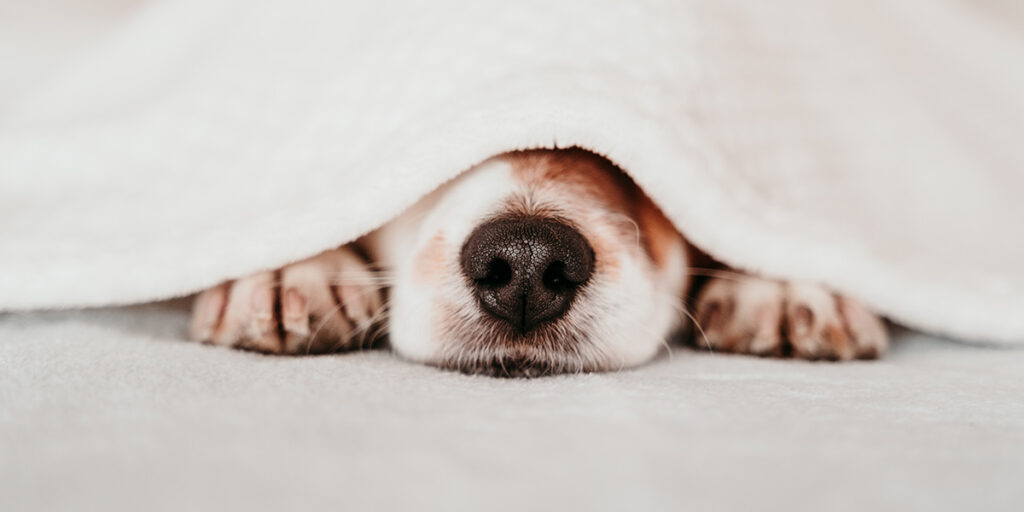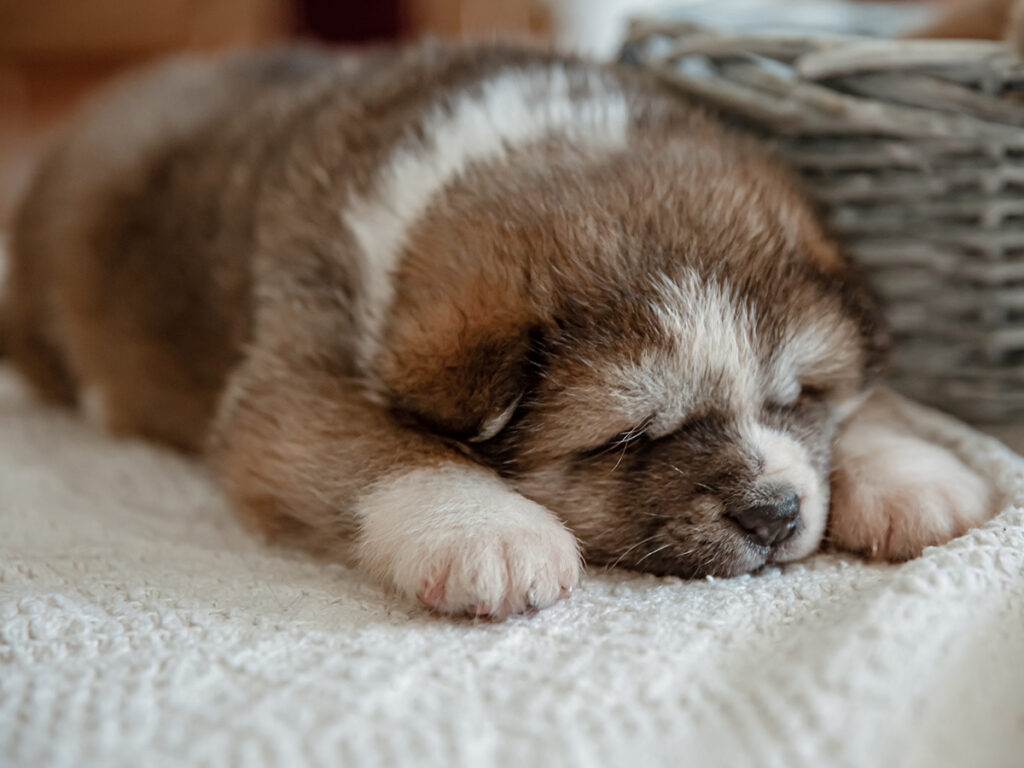Becoming a new dog parent is always a challenge. One of the things that puzzle many new dog owners as their puppy grows is the need for sleep.
Here, a few simple questions arise:
- Is it normal for a puppy to sleep a lot?
- How much do puppies sleep in general?
- What about sleep disorders? Do they exist?
In this article, we will try to answer all of these questions and many others that are related. Hopefully, we will help you better understand the importance of sleep for your growing pup!
Before resolving the main question, we will first analyze the science behind dog dreams and how essential sleep is for puppies.
Let’s uncover the truth together!
Table of Contents
Is Sleep Really Important?
Puppies are like a miniature, battery-powered version of adult dogs. They always seem to be full of energy and can play non-stop.
However, even though it seems that puppies can go all day without sleep, you are mistaken.
As your puppy gets older, their need for sleep naturally grows.
Why is that the case?
They learn new complicated and challenging things every day, starting with getting to know their everyday environment. Also, they generally begin learning some basic commands in this period.
All of that mental activity can quickly exhaust the puppy’s mind. We shouldn’t even mention the amount of physical activity they are involved in that drains the batteries just as fast. That is why an adequate amount of sleep is necessary.
Numerous studies show that lack of sleep negatively affects the development of the nervous system in the long run.
In other words, this means that if your puppy does not sleep enough, the chances are high that they will have vital problems such as poor brain development.
How Much Sleep Do Puppies Need?


Generally speaking, there is no universal answer to this question. But one thing is for sure:
Newborn puppies spend more than 80% of their time sleeping.
It is entirely normal for your puppy to sleep for almost 18 hours a day! This schedule can vary up to 20 hours, depending on the breed of dog we have on our hands. As we mentioned earlier, a bunch of seemingly light activities quickly add up and are highly strenuous for your puppy.
With adequate sleep, puppies process and absorb new information that enables their mental and physical development.
For that reason, you can expect them to take a lot of daily naps, which can last from half an hour to two hours.
Human babies have similar sleeping habits, don’t they?
What Affects The Needed Amount of Sleep?
The following factors can affect the amount of sleep your puppy needs:
- age (three vital periods – 8 weeks, 16 weeks, and 6 months);
- activity levels;
- dog breed.
#1 – Age
The first factor is the age of your puppy. It definitely plays a significant role.
Namely, dogs up to 8 weeks sleep the most. On average, most dogs of this age spend up to 20 hours in bed. Yes, 20 hours sounds like a lot, but that’s because your puppy is in an age group with a low energy level and needs a lot of sleep to get through the day.
Not much is different when your dog is 16 weeks old. Sleeping is still their favorite hobby, but puppies may start to sleep just a bit less than before as they become more active and physically developed.
The thing starts to change a bit when the dog reaches the age of 6 months. Then they slowly begin engaging in more strenuous physical activities such as running, training and their sleep is reduced to a maximum of 18 hours a day.
Only when they get to one year of age do your puppies shape their sleep like an adult dog that averages about 11 hours a day.
#2 – Activity Levels
The second factor we mentioned is the level of activity. Physical activity significantly consumes the energy that the dog possesses.
Initially, this physical activity is minimal while your pups are young. Later, things turn into longer walks or a bit more intense training that can exhaust your puppy fast.
Both physical activity and mental challenges will deplete your puppy’s energy levels just enough for them to get quality sleep and grow fast and healthy.
#3 – Dog Breed
The last factor we should take into account is the breed of the dog.
When we talk about dog breeds, we are most often based on the story of their genetic predisposition and physical constitution.
Genetic Predisposition
For example, there are dogs like Dobermans that tend to show narcolepsy. Narcolepsy is, in short, an abnormal phenomenon in which a dog suddenly falls asleep.
In addition to Dobermans, Labradors may have a tendency to develop narcolepsy. In both breeds, genetic predisposition is crucial in the manifestation of this behavior.
You should be aware of as much information as possible about your puppy’s breed. Conditions such as narcolepsy may be extreme examples, but they paint the picture well for the importance of genetics.
Physical Constitution
Secondly, we mentioned the physical constitution.
For example, a dog like the French Bulldog has a characteristic snout whose respiratory airways are narrower. That is why French bulldogs have sleep disorders due to shortness of breath caused by this distinctive structure of the respiratory airways.
Such things can majorly impact the amount and quality of sleep your puppy may need or be able to get. So take everything into account and prepare yourself accordingly.
Can Puppies Have Sleep Disorders?


As with humans, puppies may have sleep disorders.
Fortunately, sleep disorders are not common but can occur. If you notice any of the following symptoms, you should seek help from a veterinarian. Sleep disorders that can occur in puppies can be:
- insomnia,
- and sleep apnea.
Insomnia
Insomnia most often occurs when your puppy moves into the new home.
Changing the environment is something completely new, and insomnia could happen in such cases due to the puppy’s emotional reaction.
Emotionally induced insomnia usually lasts a few days and then disappears completely.
On the other hand, it is not a thing that you should take lightly. Insomnia can cause several health problems.
It can also result from various disorders, such as parasites that can wake up your puppy at night and thus break his sleep.
Sleep Apnea
Physical constitution causes sleep apnea. For example, dogs with narrower airways, such as the French Bulldog, or overweight dogs, in general, can often have interrupted airways during sleep, which can wake them up in the evening.
Sleep apnea causes puppies to stop breathing temporarily, breaking their natural sleep cycle and potentially causing long-term health issues.
How to Make Your Puppy Fall Asleep at Night


Most new dog parents have a problem when it comes to their puppies’ nighttime sleep routine.
If you, like them, have had this problem or simply want to avoid it, follow these tips:
Tip #1 – Establish a daily routine.
Plan your puppy’s activities at least a day in advance. Know precisely when you are going for each daily walk and let your puppy get used to it.
Also, try to spend 2 hours before bedtime with your dog doing basic training activities such as teaching new commands or just walking outside.
That way, your puppy’s energy supplies will drain, and they will be ready for a whole night of high-quality sleep!
Tip #2 – No food and water an hour before bed.
To avoid getting into the situation that you have to clean after your puppy in the morning, we suggest you don’t give food and drinks before bed.
Just as it can upset you, it can present a challenge for your puppy. Their bladders are tiny, and they probably won’t last until the morning.
Usually, if a puppy drinks or eats just before bed, chances are high that they will wake up during the night.
Tip #3 – Keep quiet
None of us likes noise when we want to fall asleep. Likewise, your puppy needs silence for a night of quality sleep.
For this reason, all evening routines that can be loud should be minimized to make your puppy fall asleep faster. For example, if you are watching TV or playing games, lower the volume and let the little guy or girl drift into sleepy land.
Bonus – Our Full Guide
For a complete overview of all the things you can do to get your puppy to sleep, read our complete guide by clicking here.
Conclusion
So, how much do puppies sleep?
We guess that the easiest (and most correct) answer is: a LOT!
When they are little, they need as much sleep as possible to grow strong and healthy. With adequate food and rest, you increase the chances of your puppies turning into healthy dogs with whom you will be happy to spend time.
Now it’s your turn!
How many hours a day does your puppy sleep? Have you ever noticed any sleeping disorders with your little friend?
Write your experiences below in the comments.
See you in the next post! Stay with us!
